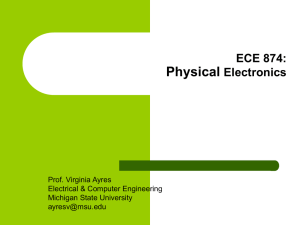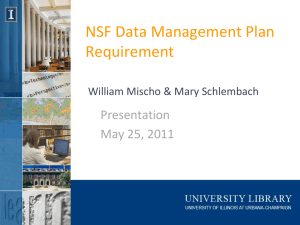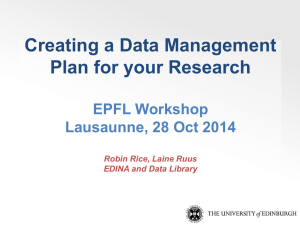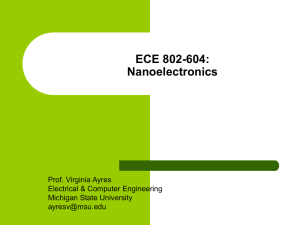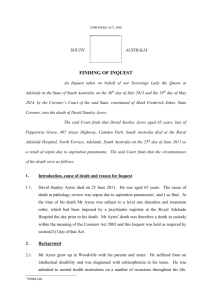ECE874 Lecture 13, 11 Oct 12
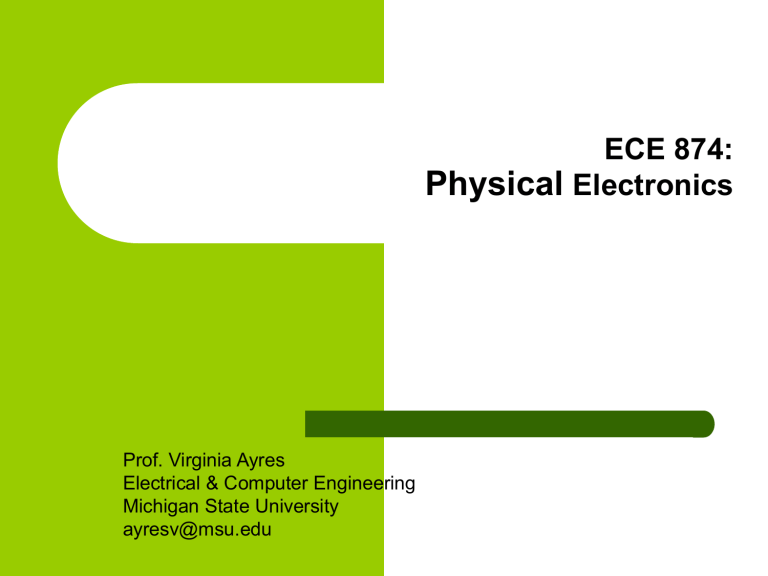
Prof. Virginia Ayres
Electrical & Computer Engineering
Michigan State University ayresv@msu.edu
ECE 874:
Physical
Electronics
Lecture 13, 11 Oct 12
VM Ayres, ECE874, F12
Finite Potential Well:
(eV)
Electron energy: E > U
0
Electron energy: E < U
0
Regions:
(nm)
∞ to 0 0 to a a to +∞
VM Ayres, ECE874, F12
Last section of Chp. 02 is about the Finite Barrier:
VM Ayres, ECE874, F12
VM Ayres, ECE874, F12
A last look at the finite well, for E > U
0 too:
VM Ayres, ECE874, F12
Finite barrier
Anderson, Modern Physics and Quantum Mechanics
VM Ayres, ECE874, F12
E > Anderson V
0
Pierret U
0
VM Ayres, ECE874, F12
E > Anderson V
0
Pierret U
0
VM Ayres, ECE874, F12
E < Anderson V
0
Pierret U
0
This is the expression for T that Pr. 2.8 is referring to.
VM Ayres, ECE874, F12
Which situation is this: to start? When part (a) is finished?
cosh sinh
VM Ayres, ECE874, F12
To start: situation is: tunnelling through the barrier cosh sinh
VM Ayres, ECE874, F12
When part (a) is finished, situation being described is: transport “over” the barrier region, by using Pr. 2.9’s mathematical manipulations
Starting description: E < U
0
Finish description for: E > U
0
VM Ayres, ECE874, F12
Which situation is this?
VM Ayres, ECE874, F12
Transport “over” the barrier region: E > U
0 with transmission coefficient T given by:
VM Ayres, ECE874, F12
Chapter 03: Energy band theory
VM Ayres, ECE874, F12
e-
VM Ayres, ECE874, F12
Next Unit cell
Describe e- as a wave:
VM Ayres, ECE874, F12
e- described as a wave fitting into a periodic U
0
What happens?
situation.
The Block theorem is the end result of boundary condition matching over multiple Unit cells. Result is:
Only a phase shift when you get back to a repeat situation.
The repeat situation is not the lattice constant unless you are moving in <100> direction. Variable “a” = the distance between atomic cores in a particulates transport direction.
VM Ayres, ECE874, F12
Another useful way to describe the same wave function for e-:
This emphasizes that the e- is described by a travelling wave exp ikx that is being modulated by a repetitive environment.
VM Ayres, ECE874, F12
The two descriptions are equivalent.
Equation (3.3) p. 54
VM Ayres, ECE874, F12
Next Unit cell
VM Ayres, ECE874, F12
Kronig-Penney model: approximate the real U(x) due to a row of atomic cores (top) by a series of wells and finite barriers (bottom).
VM Ayres, ECE874, F12
Kronig-Penney model;
VM Ayres, ECE874, F12
Kronig-Penney model allowed energy levels: where LHS = RHS
VM Ayres, ECE874, F12
Graphical solution of 2.18b:
VM Ayres, ECE874, F12
